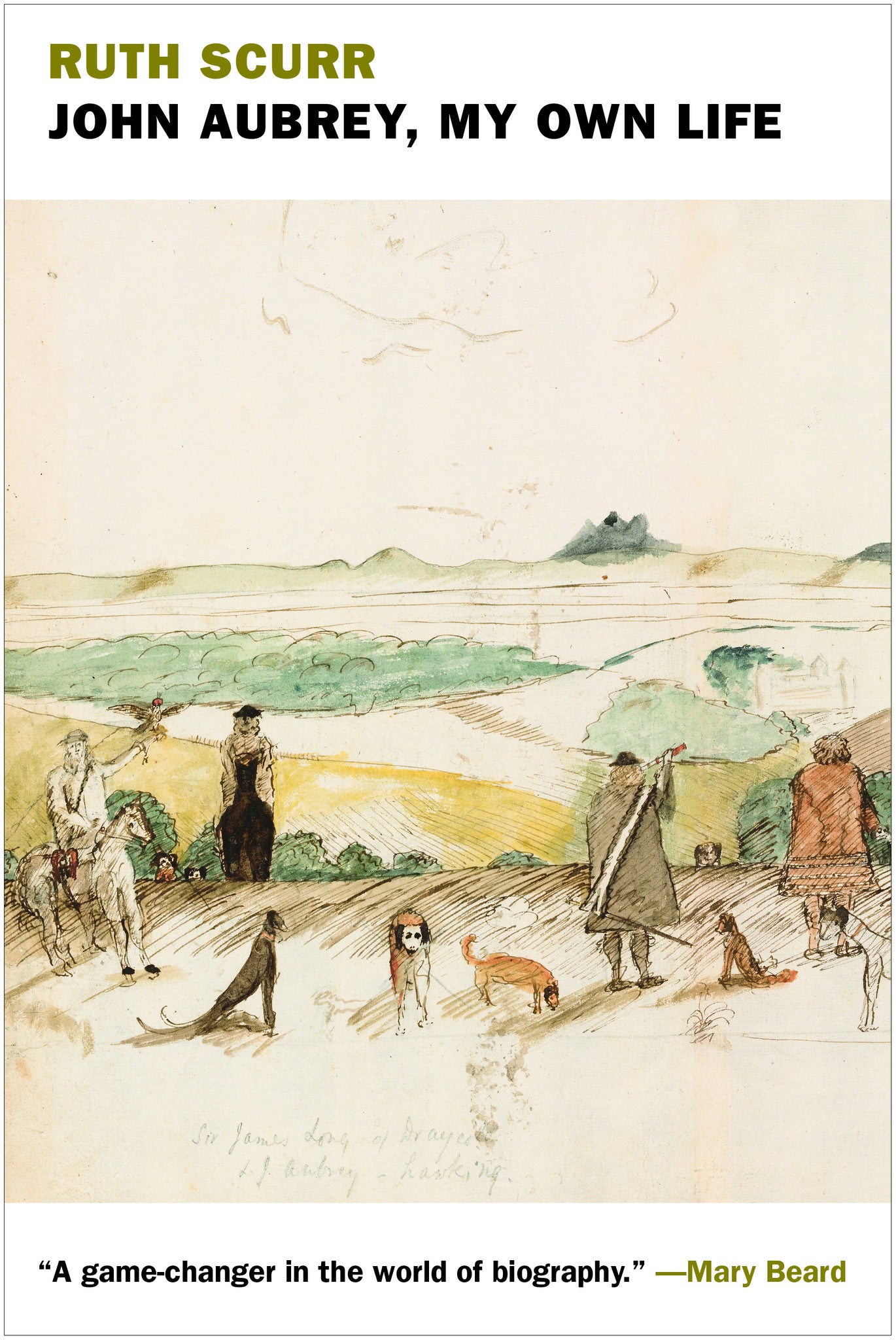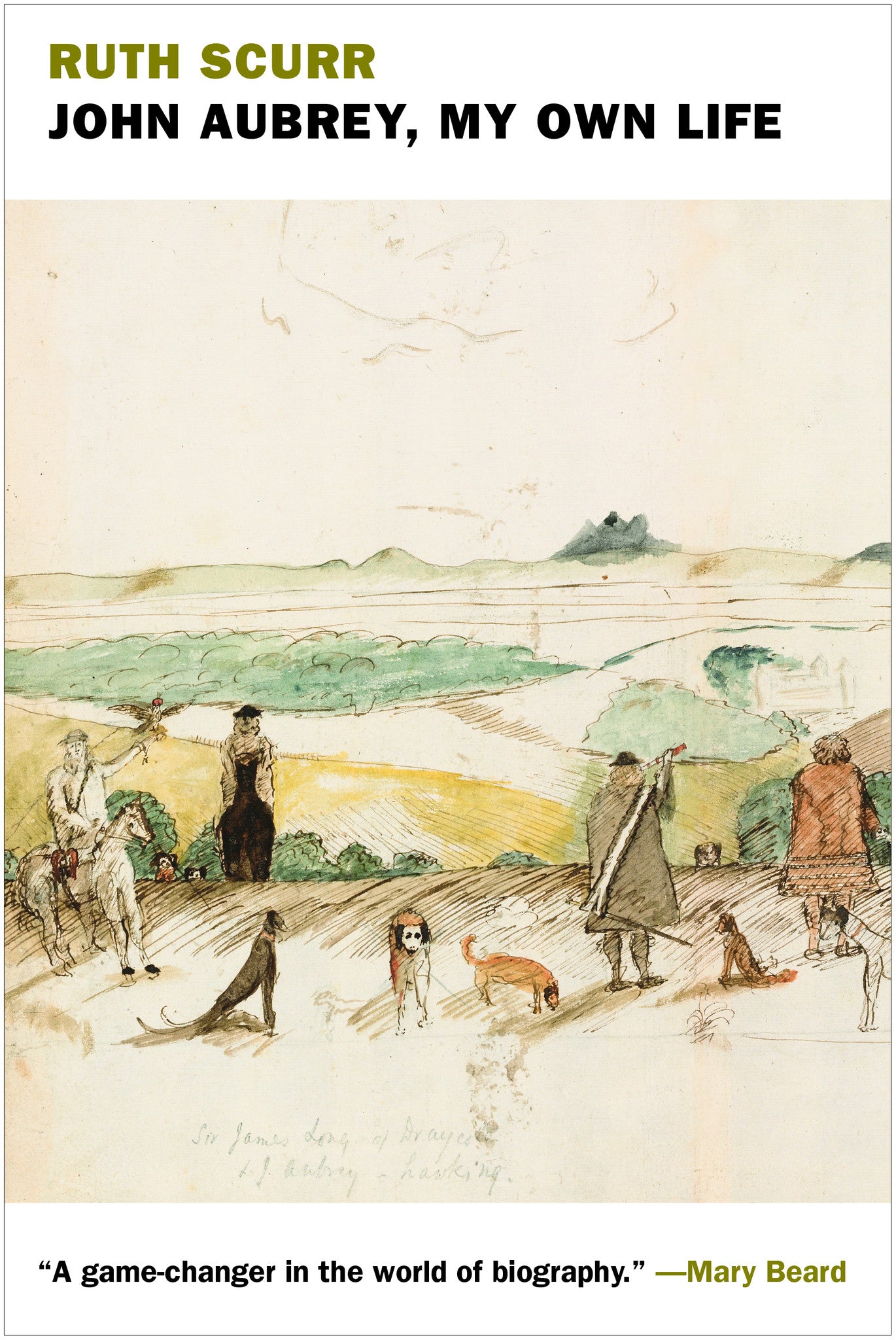A game-changer in the world of biography.
—Mary Beard, The Guardian, Best Books of the Year 2015
Bold, innovative, and consistently absorbing, John Aubrey, My Own Life, manages the dual feat of dramatizing a brilliant biographer and reinterpreting the art of biography.
—Malcolm Forbes, The Weekly Standard
The English biographer, naturalist, philosopher and convivial wit John Aubrey (1626-97) did not leave a diary behind, to the dismay of those who admire his writing about other people. In an ingenious new book titled "John Aubrey: My Own Life," the historian Ruth Scurr has made one for him, and it is a thoroughgoing delight. Ms. Scurr has rummaged through Aubrey’s letters, books and unpublished manuscripts. She has isolated his writing about his own life and set it in chronological order, modernizing spellings and adding discreet commentary when necessary...She has done the world a service in compiling "John Aubrey: My Own Life." This is a funny book, and a wise and moving one, that delivers to us a man in full.
—Dwight Garner, The New York Times
[Scurr's] book is composed as an invented diary, stitched together from Aubrey's correspondence and manuscripts and details pulled from the "Brief Lives"...the conceit is daring and ingenious. The tone is pitch-perfect; the seam-work is invisible. Readers of the right temperament will treasure "John Aubrey, My Own Life."
—Jeffrey Collins, The Wall Street Journal
Displaying an admirable chutzpah as well as scholarly care and sensitivity, Cambridge historian Ruth Scurr actually relates Aubrey’s life using only his own words. In effect, she has mined his archival and printed work to fashion his own personal — and wildly entertaining — diary...Anyone who loves history or human idiosyncrasy will almost certainly love "John Aubrey, My Own Life.”
—Michael Dirda, The Washington Post
My Own Life is light, ingenious, inspiring, a book to reread and cherish. The vigour and spirit on every page would delight John Aubrey, that most individual of thinkers and writers, who has found a biographer of originality and wit. It is reverent, charming, poignant: it is made of the same ingredients as its subject.
—Hilary Mantel
[Scurr’s] book is composed as an invented diary, stitched together from Aubrey’s correspondence and manuscripts and details pulled from the “Brief Lives”…the conceit is daring and ingenious. The tone is pitch-perfect; the seam-work is invisible. Readers of the right temperament will treasure John Aubrey, My Own Life.
—Jeffrey Collins, The Wall Street Journal
Scurr brings [John Aubrey] brilliantly to life by using surviving letters and manuscripts to craft the diary he never wrote…Scurr’s diary format allows us to watch him grow from a curious boy who “like[s] to think about the past” to a man quietly passionate about everything ancient...Indeed, the Aubrey whom Scurr recreates for us is as charming and entertaining as his “diary,” which Scurr has rendered accessible by modernizing spelling and word choices. This book is both a wonderful historical resource and a delight to read.
—Publishers Weekly, starred review
A historian and literary critic offers a unique and revealing look at the life of English philosopher John Aubrey (1626-1697), told in Aubrey's voice in the form of a diary....A creative, engaging, and profoundly moving account of a man's fierce desire to discover, understand, and preserve.
—Kirkus (starred review)
In her innovative life of the author of the immensely influential Brief Lives, sketches of most of
seventeenth-century England’s intellectual elite, Scurr creates a life-spanning diary out of Aubrey’s own words in his manuscripts and letters and as reported by contemporaries, arranging them “playingly” (as Aubrey said of his writing) but “carefully in chronological order"...the book bubbles with the energy and obsessions of the fussy, totally committed Aubrey...Quite the man, vividly present here.
—Booklist
John Aubrey, My Own Life turns the notion of biography on its head, transforming a normally third person history into a lively first person account of seventeenth century Britain—an era when New World explorations collided with Old World beliefs, when apples were falling on Newton’s head, and axes were falling the heads of others…Scurr knits the threads of Aubrey’s own words with a sure hand, modernizing both a classical biographer and the classical notions of biography.
—Michael Barron, The Culture Trip
What’s remarkable about this book is how contemporary so much of the 17th century appears through Aubrey’s telling, and how his writing, even (or especially) at its most self-deceptive, makes him seem so much like someone you know (or are). It’s a tremendous accomplishment and something that doesn’t even make you feel like you’re doing Serious Reading, but you still get the points anyway.
—Alex Balk, The Awl
Scurr has written Aubrey’s life in diary form, boiling down and modernizing his voluminous writings to produce a fascinating chimera of old and new. One gets the sense Aubrey himself would very much have appreciated the result, which brings him and his times to life.
—Matthew Wills, JStor Daily
Scurr has invented an autobiography the great biographer never wrote, using his notes, letters, observations—and the result is gripping.
—A.S. Byatt, The Guardian
Another writer of brief lives, Lytton Strachey, feared that in our modern civilization John Aubrey would ‘never come into existence again.’ But that is exactly what he does in Ruth Scurr’s absorbing and imaginative biography. In these pages his purchase on posterity returns with all his ingenious visions and impulses. Scurr is no less a pioneer biographer than Aubrey himself.
—Michael Holroyd
An audacious and successful attempt to write a biography in the subject’s own words. Scurr has ingeniously edited Aubrey’s swift, vivid prose into a coherent account of the life lived by one of the most interesting (and interested—in everything) writers of our most exciting century, the seventeenth. Irresistible.
—Philip Pullman, The Guardian
Haunting, memorable and, in the field of nonfiction, unprecedented.
—William Boyd
A genuinely remarkable work of biographical innovation. Using Aubrey’s own words, Oulipo-style, [John Aubrey: My Own Life] constructs the diary he never wrote and places a man so often seen as lurking on the margins and snapping up unconsidered trifles into substantial and melancholy figures. A biography brave enough to leave gaps is a very human and humane undertaking.
—Stuart Kelly, “Books of the Year” 2015, The Times Literary Supplement
To me this book is a delight and...it is the one that I would take with me to a desert island.
—David Aaronovitch, The Times (London)
For me, the academic historian, Scurr’s experimental ‘act of scholarly imagination’ has already modified significantly my own historical understanding.
—Lisa Jardine, Financial Times
[A] moving and delicate book.
—Frances Wilson, New Statesman
Scurr’s judgment and scholarship in constructing Aubrey’s own account of events are so flawless that she allows us almost to forget that she is there.
—Alexandra Harris, The Guardian
The marriage of [Aubrey’s] words and Scurr’s is so smoothly achieved that I have no idea where one leaves off and the other intervenes.
—Allan Massie, The Scotsman
Scurr’s imaginative feat of retrieval has produced a perfect book for dipping into when you want a taste of what it was like to be alive in the 17th century.
—John Carey, The Sunday Times
It is a testament to [Scurr’s] skill that you quickly stop thinking about technique and instead slip happily into the company of the character she has created. The wealth of research and the seams between imagination and reality disappear from view. This is truly selfless biography.
—Daisy Hay, The Daily Telegraph
A delightful read about the ebb and flow of thoughts in one extraordinary man’s mind.
—Claire Harman, Evening Standard
Drawing on [Aubrey’s] manuscripts and letters, [Scurr] has fashioned, as chronologically as possible, an autobiography in the form of the diary that Aubrey never wrote. It fits him perfectly...Scurr has done him proud.
—The Economist
It is a bold and brilliant experiment, but it suits the fragmentary nature of Aubrey’s work and life.
—Andrew Brown, The Sunday Telegraph
[Scurr] makes nothing up but she writes in [Aubrey's] voice, confecting the established record of his life into an autobiography of remarkable authority and immediacy. The dramatis personae, endnotes, and bibliography make this an indispensable and riveting work of scholarship and art.
—Carl Rollyson, CHOICE Magazine






